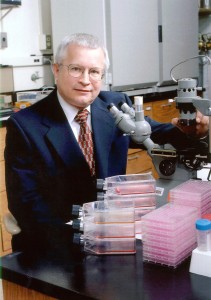NEJM today publishes findings of international trial resulting in recent FDA approval of Abraxane (nab-paclitaxel) for patients with advanced pancreatic cancer.
SCOTTSDALE, Ariz. — Oct. 16, 2013 —
 By all measures, the addition of nab-paclitaxel for the treatment of patients with advanced pancreatic cancer was superior to the survival for patients who received only gemcitabine, according to the results of a study led by the Translational Genomics Research Institute (TGen) and Scottsdale Healthcare, published today by The New England Journal of Medicine.
By all measures, the addition of nab-paclitaxel for the treatment of patients with advanced pancreatic cancer was superior to the survival for patients who received only gemcitabine, according to the results of a study led by the Translational Genomics Research Institute (TGen) and Scottsdale Healthcare, published today by The New England Journal of Medicine.
The study of 861 patients, conducted at 151 community and academic centers in 11 nations, found that the 431 patients assigned nab-paclitaxel — in addition to the standard-of-care gemcitabine — had significantly improved overall survival, progression-free survival, and drug response rates than for the 430 assigned to gemcitabine alone.
“This large, randomized, international, phase 3 study showed that the nab-paclitaxel plus gemcitabine led to a significant improvement in survival at all time points,” said Dr. Daniel D. Von Hoff, TGen Distinguished Professor and Physician-In-Chief, and Chief Scientific Officer for the Virginia G. Piper Cancer Center Clinical Trials at Scottsdale Healthcare, a partnership with TGen.
“The rate of survival was significantly higher in the nab-paclitaxel-gemcitabine group than in the gemcitabine group,” said Dr. Von Hoff, lead author among the study’s 23 co-authors and more than 130 researchers. He served as Principal Investigator of MPACT (Metastatic Pancreatic Adenocarcinoma Clinical Trial), which included sites in North America, Europe and Australia.

Dr. Daniel D. Von Hoff, TGen Distinguished Professor and Physician-In-Chief, and Chief Scientific Officer for the Virginia G. Piper Cancer Center Clinical Trials at Scottsdale Healthcare, a partnership with TGen
Dr. Von Hoff, considered among the nation’s leading authorities on pancreatic cancer, also was the principal investigator for the first clinical trial of gemcitabine, the first therapy to show improvement in survival for patients with pancreatic cancer. The FDA approved gemcitabine in 1996.
On Sept. 6, the U.S. Food and Drug Administration (FDA) approved nab-paclitaxel (produced by Celgene Corporation under the brand name Abraxane) for use in advanced pancreatic cancer patients. Abraxane previously was approved by the FDA for use in the treatment of metastatic breast cancer (2005) and advanced lung cancer (2012).
While it is still uncertain exactly how Abraxane works, Abraxane wraps traditional chemotherapy, paclitaxel, in near-nano sized shells of albumin, a protein that the tumor could recognize as food. Once inside the tumor, the Abraxane may act like a “Trojan Horse” to release chemotherapy and kill the cancer cells.
Participants treated with Abraxane plus gemcitabine lived, on average, 1.8 months longer than those treated with gemcitabine alone, and they experienced a delay in tumor growth (progression-free survival) that was, on average, 1.8 months later than the participants who only received gemcitabine.
Of note, 35 percent of patients who also received Abraxane survived more than 1 year, a 59 percent increase over the 22 percent of those receiving only gemcitabine who survived more than 1 year. Also, more than twice as many patients (9 percent) who also received Abraxane survived more than 2 years, compared to those (4 percent) who only received gemcitabine.
“This a major breakthrough, but there is more work to be done. Building on these results, we are evaluating new targeted agents in combination with the Abraxane/gemcitabine regimen,” said Dr. Ramesh Ramanathan, Medical Director of the Virginia G. Cancer Center Clinical Trials at Scottsdale Healthcare, and MPACT principal investigator for the United States.
The most significant side effect from the addition of nab-paclitaxel was peripheral neuropathy, such as numbness in the hands and feet, although this occurred in only a small proportion of patients and was “rapidly reversible in most patients” by temporarily halting the drug and subsequently reducing its dosage. None of the patients experienced severe (grade 4) neuropathy.
The pancreas is a glandular organ behind the stomach that secretes enzymes to help digestion, and produces hormones, including insulin, which helps regulate blood-sugar metabolism.
“We are very grateful to the Seena Magowitz Foundation and to the Bedding Industry, which supported the research, leading to this important new survival-improving combination therapy,” said Dr. Von Hoff. “We also appreciate the support of Stand Up To Cancer.”
For information about eligibility to participate in clinical trials at the Virginia G. Piper Cancer Center at Scottsdale Healthcare, contact the cancer care coordinator at 480-323-1339; toll free at 1-877-273-3713 or via email at clinicaltrials@shc.org.
The New England Journal of Medicine article is available at: http://www.nejm.org/doi/full/10.1056/NEJMoa1304369.
# # #
About the Virginia G. Piper Cancer Center at Scottsdale Healthcare
The Virginia G. Piper Cancer Center at Scottsdale Healthcare in Scottsdale, Ariz. offers comprehensive cancer treatment and research through clinical trials, diagnosis, treatment, prevention and support services in collaboration with leading scientific researchers and community oncologists. Scottsdale Healthcare is the nonprofit parent organization of the Virginia G. Piper Cancer Center at Scottsdale Healthcare, Scottsdale Healthcare Research Institute, Scottsdale Healthcare Osborn Medical Center, Scottsdale Healthcare Shea Medical Center and Scottsdale Healthcare Thompson Peak Hospital. For more information, visit www.shc.org.
Press Contact:
Jamie Grim
Virginia G. Piper Cancer Center at Scottsdale Healthcare
480-323-1387
jgrim@shc.org
*
About TGen
Translational Genomics Research Institute (TGen) is a Phoenix, Arizona-based non-profit organization dedicated to conducting groundbreaking research with life changing results. TGen is focused on helping patients with cancer, neurological disorders and diabetes, through cutting edge translational research (the process of rapidly moving research towards patient benefit). TGen physicians and scientists work to unravel the genetic components of both common and rare complex diseases in adults and children. Working with collaborators in the scientific and medical communities literally worldwide, TGen makes a substantial contribution to help our patients through efficiency and effectiveness of the translational process. For more information, visit: www.tgen.org.
Press Contact:
Steve Yozwiak
TGen Senior Science Writer
602-343-8704
syozwiak@tgen.org
